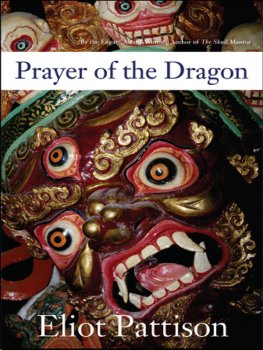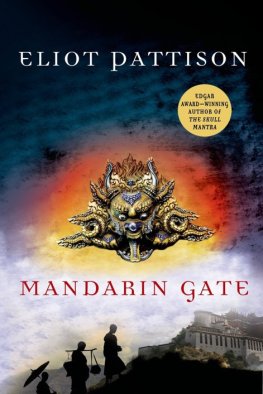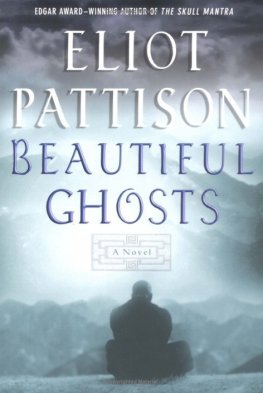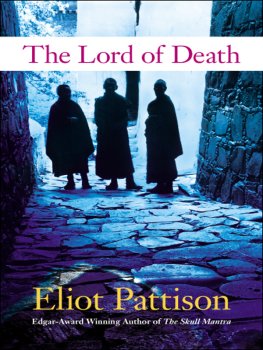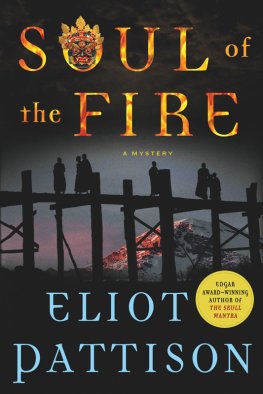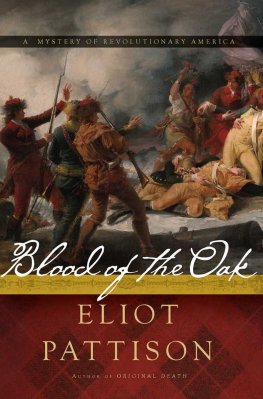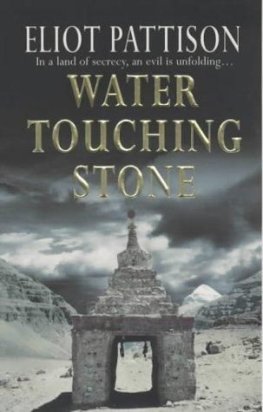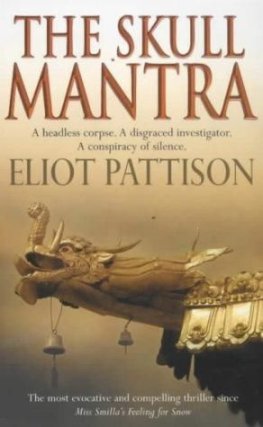Eliot Pattison - Prayer of the Dragon
Here you can read online Eliot Pattison - Prayer of the Dragon full text of the book (entire story) in english for free. Download pdf and epub, get meaning, cover and reviews about this ebook. year: 2007, publisher: Soho Press, genre: Detective and thriller. Description of the work, (preface) as well as reviews are available. Best literature library LitArk.com created for fans of good reading and offers a wide selection of genres:
Romance novel
Science fiction
Adventure
Detective
Science
History
Home and family
Prose
Art
Politics
Computer
Non-fiction
Religion
Business
Children
Humor
Choose a favorite category and find really read worthwhile books. Enjoy immersion in the world of imagination, feel the emotions of the characters or learn something new for yourself, make an fascinating discovery.
- Book:Prayer of the Dragon
- Author:
- Publisher:Soho Press
- Genre:
- Year:2007
- ISBN:9781569475348
- Rating:3 / 5
- Favourites:Add to favourites
- Your mark:
- 60
- 1
- 2
- 3
- 4
- 5
Prayer of the Dragon: summary, description and annotation
We offer to read an annotation, description, summary or preface (depends on what the author of the book "Prayer of the Dragon" wrote himself). If you haven't found the necessary information about the book — write in the comments, we will try to find it.
Prayer of the Dragon — read online for free the complete book (whole text) full work
Below is the text of the book, divided by pages. System saving the place of the last page read, allows you to conveniently read the book "Prayer of the Dragon" online for free, without having to search again every time where you left off. Put a bookmark, and you can go to the page where you finished reading at any time.
Font size:
Interval:
Bookmark:
Eliot Pattison
Prayer of the Dragon
Chapter One
Before being condemned to the Tibetan gulag, Shan Tao Yun had never known there were so many ways of dying, so many words for death, had never considered how the wonder of death could be as great as the wonder of birth. Tibet was a land steeped in riddles, and, for Shan, none was greater than how, in a place where living was so difficult, dying could be so perfect.
For more than five days now, the elderly man on the pallet in front of him had been sitting cross-legged in the lotus position. Shans former cellmate, Lokesh, now his friend, had told him this upon Shans recent arrival. Though death hovered nearby, something in the elderly mans spirit kept it at bay. He was in a place few attained. After the first two days, the people of the remote village had replaced the death-rite objects at his side with offerings of fruit and small butter sculptures. Some believed that if a patch of his skin was peeled away there would be only blinding light beneath.
Gendun, the aged red-robed lama who sat at the head of the pallet, intoned an unfamiliar mantra, invoking a deity Shan did not recognize. Lokesh had accompanied Gendun from their illegal, secret monastery to this remote village when summoned. Shan, who had been away at the time, had been sent for when they realized the nature of the problem. Now Lokesh settled beside Shan and rubbed his grizzled jaw. A woman waved a stick of incense over the inert form on the pallet. They say he is in a state of spiritual perfection, Lokesh declared in a flat voice.
Shan studied his two friends. Gendun, his face as worn as a river stone, acknowledged Shan with a nod, not breaking the rhythm of his prayer. Lokesh, gazing at the peaceful countenance of the man on the pallet, squeezed the prayer beads in his hand so tightly his knuckles were white. Shan knew he had not been urgently summoned over nearly a hundred miles of treacherous mountain trails to witness an unknown farmers miracle.
Except? he asked.
Lokesh cupped his hands around his beads and stared into the hollow they made. His whisper combined wonder and melancholy. Except he is a murderer.
Shan sank back against the wall, his eyes now locked on Gendun. If the old lama, abbot of the outlawed monks Shan had lived with since leaving his gulag prison, had sat with the man for so many days, by now he would understand things about the stranger no one else could, in ways no one else would, though he would never express them in words. Gendun, like many of the old Buddhists, distrusted words, considering them only awkward, incomplete links between humans. He would not speak directly about the peculiar mix of fear and awe that seemed to hold the village in its grip. But Shan knew his teacher well and had seen the moments hesitation in his nod. He surveyed the villagers sitting along the wall of the smoky dirt-floored chamber who were anxiously watching the man on the pallet. Gendun and Lokesh werent engaged in this uneasy vigil because of a killing but because these impoverished farmers were trembling in their souls. They depended on Shan to cope with the murder-his province, not theirs.
Shans senses had been dulled by fatigue when he had reached the village. He had rushed through the mountains, barely keeping up with the taciturn young shepherds who had come for him, frantic with fear that disaster had befallen the two men who had become like family to him. Seeing they were safe, he had relaxed, closing his eyes for a few minutes, listening, letting Genduns soft, resonant words pour into him. Lokeshs announcement burned away the remnants of his fatigue and, alert and alarmed, he studied the old stable as he would have when he had been a Beijing special investigator. An oxlike man stood guarding the door. A cracked plank lying near the foot of the comatose mans pallet held several charred sticks, the remains of incense. In front of the incense sticks stood a row of small torma, sculptures molded of butter and barley flour, images of sacred signs, one of them artfully worked into a goddess with graceful bent arms. On a nearby wall were smudges of chalk. Shan studied the faint marks. Someone had chalked in the mani mantra, the prayer for the Compassionate Buddha. Someone else had rubbed it away.
A sturdy woman in a black dress stooped in front of Shan, extending a bowl of the buttered tea that was a fixture of Tibetan hospitality. His nod of gratitude froze as his gaze met hers. Her forced smile did nothing to conceal the grief etched on her features. The thin layer of soot on her face, common to those who illuminated their homes with butter lamps, was streaked with the tracks of tears.
The man on the pallet was tall and lean, his ragged black hair tinged with gray. He shared the weathered skin, the hard, muscular hands, the worn clothes of those sitting along the walls. He wore a soiled fleece vest that matched those of several of the farmers. Had the villagers preparing the man for the death rites bared his feet for washing, Shan would have assumed he was one of them. But now Shan saw his heavy cleated leather boots with finely worked metal fittings that reached past his ankles. They would have cost half the annual income of any family in the village. The man before them, perched like a god on an altar, came from somewhere else, from down in the world. Perhaps from Lhasa?
A dozen questions sprang to Shans mind about the stranger on the pallet, but the deepest mystery was that of his own friends actions. The man was wedged against the back wall, loose blankets at either side arranged to hide other, rolled blankets that held his legs in the meditation position. Yet Gendun and Lokesh must know that the man was unconscious, not meditating.
Shan sat, studying Gendun and the stranger on the pallet, watching the nervous way the villagers approached when the lamps had to be replenished, not missing the wary looks they cast toward Gendun. Few of them, he suspected, had seen a real monk in years, the younger ones perhaps never. Beijing had scoured the land so harshly it was difficult for new growth to find a hold.
He leaned toward his old friend. Who rises? he asked in a whisper, knowing Lokesh would understand.
Red Tara, came the hesitant reply. The mantra Gendun recited was an invocation of a fierce form of the Tibetan mother deity, called upon to fight demons and obstacles to compassion. Shan again gazed at the faces of those gathered in the stable. The lamas mantra was not for the man on the pallet, but for the villagers.
Lokesh was strangely restless, leaving Shans side to help with the lamps, taking a seat away from Shan near the door, then rising to stand in the doorway and look outside, sitting again to work his mala, his prayer beads. Shan had seldom seen his friend so unsettled. The one time he returned Shans gaze there was something Shan had never seen before in his eyes, not even in their gulag days-a terrible desperation, an anguished helplessness.
When Lokesh stepped outside, Shan rose to follow but halted, retreating into the shadows. A new figure had appeared, a stocky man in a black sweatshirt with its hood pulled low over his face. He angrily pushed past the guard and marched toward the pallet. Shan sprang forward but he was too late. The intruder raised his hand and slapped the face of the unconscious man. The woman in the black dress moaned. An old man beside Gendun cried out in alarm but as he tried to grab the intruders arm he was knocked to the ground. An instant later the guard and another burly farmer each seized one of the intruders arms, pulling him backward.
Stickman! The intruder spat the word as if it were the name of a devil as he wrestled his arms free. We know the face of death on this mountain! The guard picked up a short, stout plank and threatened the man with it. The intruder responded with a sneer. Bloodwalker! he snarled, then reached into his pocket, threw something at the man on the pallet, and turned toward the door. But before he reached it, he halted, darted to the torma offerings, bent over them, and tossed something else at the pallet. The men dragged him outside.
Font size:
Interval:
Bookmark:
Similar books «Prayer of the Dragon»
Look at similar books to Prayer of the Dragon. We have selected literature similar in name and meaning in the hope of providing readers with more options to find new, interesting, not yet read works.
Discussion, reviews of the book Prayer of the Dragon and just readers' own opinions. Leave your comments, write what you think about the work, its meaning or the main characters. Specify what exactly you liked and what you didn't like, and why you think so.

